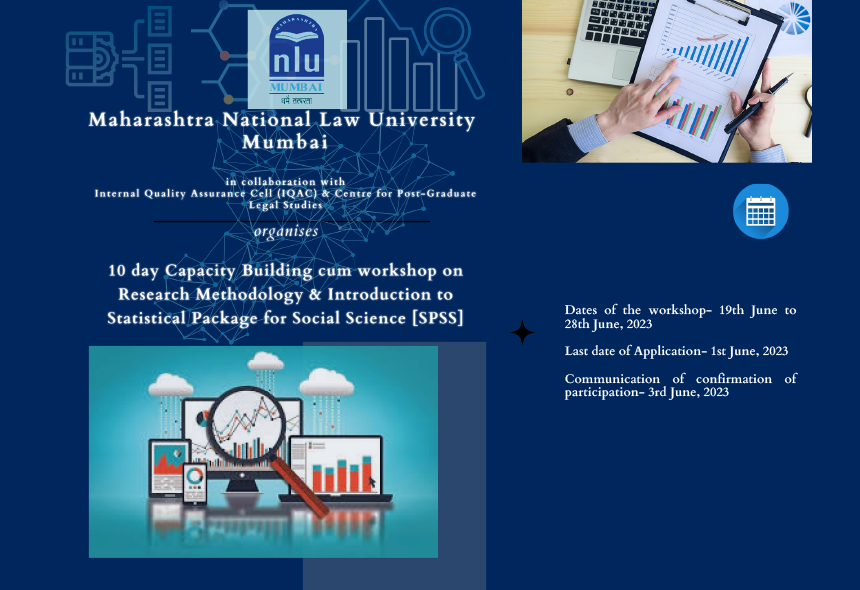About MNLUM:- MNLU Mumbai established under the Maharashtra National Law University Act 2014 on 20th March 2014, is one of the premier National Law Universities in India. The Act envisaged to establish National Law University in Maharashtra to impart advanced legal education and promote society-oriented research in legal studies for the advancement of the societal life of the people in the country.
About the Course-: -Rigorous, interdisciplinary, discipline-based research are the hallmark of this Postgraduate level Program at MNLU Mumbai. The program is committed to educating research scholars who intend to carry out productive research in the area of Constitutional, Corporate, Civil, Criminal, and Human Rights laws, etc. that characterize increasingly challenging problems across national and international domains.
We, at MNLU Mumbai, believe in the importance of diversity in our department and the research fields we work in. We aim to create and foster a collaborative environment within the department where everyone feels welcome. We encourage applicants of all backgrounds and ages to apply, particularly women, disabled, BAME, and LGBTQIA+ candidates. MNLU Mumbai is committed to equality, diversity, and inclusion. Keeping in view the above, this year’s Research Methodology Workshop is being organized with the aim of conducting theoretical as well as activity-based learning. It is being organized in consonance with UGC Guidelines.
Participation –
Ph.D. students and researchers looking to master SPSS skills
and publish in high-impact/ peer-reviewed journals.
Faculties from Universities and Colleges.
Professionals looking for a career in analytics in the corporate sector, looking to master SPSS and advance their data analysis skills.
Participation
The intake of participants will be up to 50 participants, which includes a maximum of 40 participants from India and 10 participants from Asia & other regions. Each participant is expected to bring a personal computer to the workshop.
The certificate would be given to the participants upon successful completion of the program.
Prospective participants should fill out the registration form and share the receipt of the payment on academicevents@mnlumumbai.edu.in
This should reach us on or before 1st June 2023.
The confirmation of participation will be communicated by 3rd June 2023 to all the confirmed participants.
Time of the Workshop: 10 am to 5pm
For any queries, please write to us at
academicevents@mnlumumbai.edu.in
or contact our student coordinator
Matil Mittal
(+917889063523)
Duration
In view of the types of inputs to be covered in this workshop, the duration of ten days would be sufficient.
Note-
-
Workshop Mode is Hybrid (Offline and Online) for all Participants.
-
Lunch/ high tea shall be provided to all participants.
-
No accommodation shall be provided.
-
No TA/DA shall be provided
Participation Fee:-
-
Asian/other foreign delegates 200 USD
-
Indian delegates Rs. 3000/-
The proposed training interaction is geared to achieve the following objectives:
-
To provide training on the use of SPSS in research and data analysis.
-
To cover tests including three different t-tests, two ANOVAs, post hoc tests, chi-square tests (great for A/B testing), correlation, and regression.
-
To assist participants in defining the research problem, creating a solution to the problem, and selecting an appropriate research design.
-
To impart competencies for hypothesis creation and testing.
-
To determine the suitability of the statistical software package [SPSS] for the analysis of research data.
-
To help participants understand how to write reports and research proposals.
-
To make participants self-reliant for data analysis using SPSS.
-
To help them understand the significance of publishing a quality research paper in SCOPUS, CARE List, and high-impact factor journals.
-
To determine the suitability of SPSS for the analysis of the research data.
-
To understand Qualitative and Quantitative Research Methodology.
-
Research Methodology- Assessing the needs in socio-legal spheres
-
Developing Research Proposals: Concepts and Skills
-
Methodological Innovations in doctrinal and non-doctrinal Legal Research
-
Legal Impact analysis
-
Evaluation studies in legal spheres
-
Case Analysis Method
-
Content Analysis for Legal Research
-
Quantitative and Qualitative Applications in -Legal research
-
Software in legal research practice.
-
Developing data analysis plan for computerization
-
Use of parametric and non-parametric Statistics in data analysis
-
Use of graphics and diagrams in data analysis.
-
Basic skill for searching socio-legal information
-
Presentations of assignments on Research proposals prepared by the participants.
-
Report Writing
-
-
Introduction and Inaugural Session
-
Introduction to Research Methodology
-
Quantitative Research Methodology
-
Quantitative Data Collection & Analysis
-
Literature Review
-
Methods used in Doctrinal and Empirical Legal Research
-
Report Writing
-
Writing Synopsis for Doctrinal/Non-Doctrinal Research
-
Feminist Legal Research Methodology
-
Theory and Empirical Reference
-
Social Network and Analysis of Socio-Legal Research
-
Statistical Techniques
-
Usage of Quantitative research software: SPSS
-
Application of SPSS software
Organising COMMITTEE:-
PROF.(DR.) DILIP UKEY
(COURSE DIRECTOR)
VICE CHANCELLOR, MNLU MUMBAI
PATRON
PROF.(DR.) ANIL G.VARIATH,
REGISTRAR I/C, MNLU MUMBAI
CO PATRON
DR. ANAND N. RAUT,
(COURSE CO-DIRECTOR)
ASSITANT PROFESSOR, HOD (PG), MNLU MUMBAI
DR. GARIMA PAL,
ASSISTANT PROFESSOR, MNLU MUMBAI
AASTHA TIWARI,
RESEARCH ASSISTANT
STUDENT COORDINATORS:
MATIL MITTAL
VEDANT MAINKAR
VAISHALI JAIN
PAREE THAKKER
PRIYA PUROHIT
ADITYA AGARWAL
To know more click on WORKSHOP BROCHURE.






